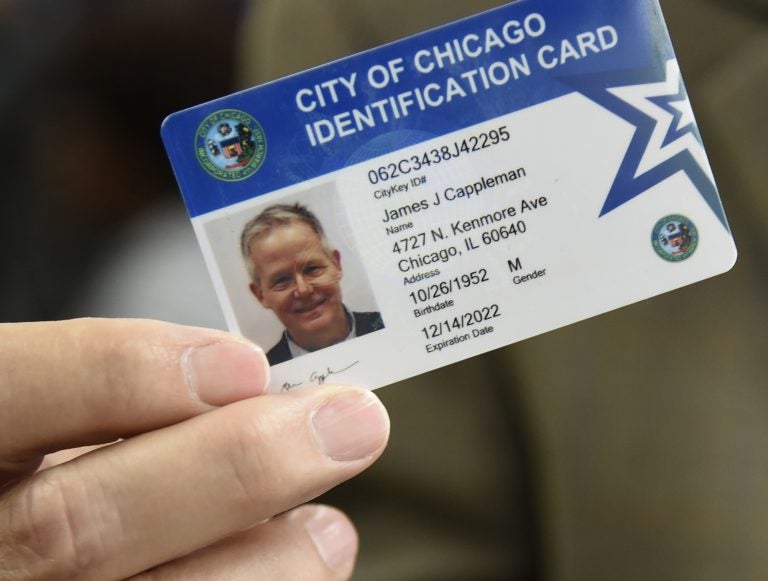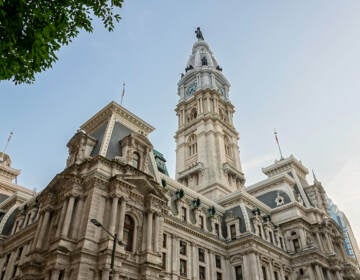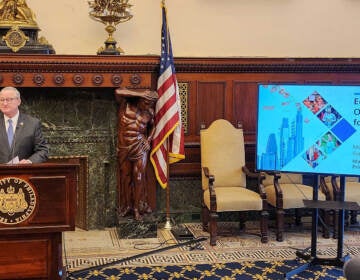Philadelphia set to roll out municipal IDs in January
Many populations in the city are unable to access services because they lack the proper identification. Issuing municipal IDs is expected to solve that problem.

Alderman James Cappleman holds his CityKey ID card, Friday, June 8, 2018, in Chicago. The city of Chicago is sending out staffers into various communities to get the municipal ID cards into the hands of undocumented immigrants, homeless people, senior citizens and others who often find it hard to obtain a valid form of identification. Officials hope that in a couple of years more than 100,000 Chicago residents will have the cards that can be used to register to vote and do things like check out a book from the library. (AP Photo/Annie Rice)
Without a government-issued ID, many Philadelphians can’t open a bank account or set foot in their children’s school.
City officials are looking to change that by issuing identification cards for residents without such a credential — whether it’s due to their immigration status, economic reasons or other barriers.
Many populations in the city are unable to access services because they lack the proper identification, said Joanna Otero-Cruz, deputy managing director of community services.
“We want to ensure that individuals are receiving their basic needs and that the barrier is not a physical picture ID,” she said.
Those in need of an ID may include the city’s large elderly and homeless populations, as well as former inmates.
“So it’s not solely for immigrant populations, and I think that’s important,” she said.
A municipal ID will open the door to amenities ranging from behavioral health services to certain food pantries.
“We have a huge opioid crisis right now, one we’ve never seen before,” Otero-Cruz said. “While we’re working through getting waivers for different things, it would become much more of a seamless process for individuals who want to access medical treatment, and having an ID would expedite that.”
Several other cities — including New York, Chicago, and Newark, New Jersey — have issued municipal IDs.
Otero-Cruz, who said the program is in the design and development phase, said the city is hiring five full-time workers to run it.
Expected to cost $580,000 to start up and run in the first year, the program will be based in City Hall and have a mobile site traveling the city to help residents sign up.
The cost of the IDs is still being determined, but officials hope for a minimal fee.
Philadelphians can apply for the IDs beginning in January.
“At the end the day, we want to make sure that our residents have access to the services they need to have a good quality of life,” she said. “Oftentimes that does require identification.”
Philadelphia Councilwoman Maria Quiñones-Sánchez sponsored the legislation for such a program in 2013 and again in 2016.
“For us, in the city of Philadelphia, we figured out pretty quickly that access to an ID was becoming a real impediment for people to access their local government,” she said.
While residents can get an ID card from the state Department of Transportation, those cards can cost as much as $45, she said.
“It was about giving people access to an affordable form of identification and managing that,” the councilwoman said.
Currently, 20,000 city workers have different IDs, depending on their department. So another advantage of the program, she said, is that one municipal ID will streamline the system and save money.
And she hopes the cards can include additional benefits, such as discounts to the Philadelphia Zoo, sporting events and museums.
“We really want to make sure that in addition to that utilization that we optimize some of the city attributes that we think are beneficial,” Quiñones-Sánchez said.
It’s possible city banks and public libraries may accept the ID as well, she said.
Quiñones-Sánchez’s 2016 bill was slowed due to privacy concerns. Philadelphians’ data will not be kept, she said, and the recently hired vendor was chosen partially for its encryption and security expertise.
The legislation is currently held in committee, but Quiñones-Sánchez is working with Philadelphia Mayor Jim Kenney’s office to pass the enabling legislation. A City Council vote is expected in September.
WHYY is your source for fact-based, in-depth journalism and information. As a nonprofit organization, we rely on financial support from readers like you. Please give today.




